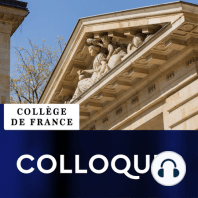Écoute de 55 min

Colloque - Virtual and Augmented Realities: Epistemological and Metaphysical Issues : On the Limits of Successful Virtualization
Colloque - Virtual and Augmented Realities: Epistemological and Metaphysical Issues : On the Limits of Successful Virtualization
évaluations:
Longueur:
40 minutes
Sortie:
5 juin 2023
Format:
Épisode de podcast
Description
Claudine TiercelinMétaphysique et philosophie de la connaissanceAnnée 2022-2023Colloque - Virtual and Augmented Realities: Epistemological and Metaphysical Issues : On the Limits of Successful VirtualizationIntervenant(s)Pawel Grabarczyk, IT University of CopenhagenRésuméIn my talk, I wish to explore the thesis of virtual realism and establish the limits of successful virtualization. The thesis of virtual realism states that virtual environments and objects are real (as opposed to fictional) and that some virtual objects can be treated as instantiations of the same category as their non-virtual counterparts. I agree with the first part of the thesis and suggest a variant I call "virtual physicalism". According to virtual physicalism, virtual objects are physical because they are a series of computer states. The second part of the thesis of virtual realism is more contentious as, apart from some well-known non-controversial examples, it is hard to say how far we can go with the virtualization of reality. I investigate this question and suggest some criteria for successful virtualization. According to my view virtual objects function as digital toys and do not require us to engage in pretend play or make-believe. As with non-virtual toys, they share many properties with objects they mimic. If they end up sharing enough properties and causal powers to be used instead of their non-virtual counterparts, they may be elevated to being instantiations of the same type of objects. The biggest obstacle for virtual objects to go through this "upgrade" process is the limitation of the causal powers of the computer states they are made of. For many virtual objects, this leads to isolation – they may be considered functionally equivalent to their non-virtual counterparts but only inside virtual environments. One way to diminish this inherent limitation is to make virtual environments important parts of reality. If they become persistent, widespread, and causally connected with non-virtual reality, the objects within them may become treated as genuine specialized versions of non-virtual objects, not just digital toys modeled on them. PrésentationVirtual Reality technology affords its users a strongly immersive and interactive experience of computer-generated environments, through a dedicated headset. With Augmented Reality devices, 3D computer-generated imagery is projected onto physical space, thereby "augmenting" the user's surroundings with an overlay of virtual entities. These "Extended Reality" (XR) technologies are likely to become a part of our everyday life in the near future. They also raise a host of fascinating issues, which have increasingly been discussed in the recent philosophical literature. This international conference will investigate the metaphysical and epistemological questions raised by XR technologies.Le colloque est intégralement en anglais et a eu lieu les 5 et 6 juin au Collège de France
Sortie:
5 juin 2023
Format:
Épisode de podcast
Titres dans cette série (100)
04 - Les sociétés africaines et le monde : une histoire connectée (1900-1980) - L'Algérie, la Guerre d'indépendance, le monde de Colloques du Collège de France - Collège de France